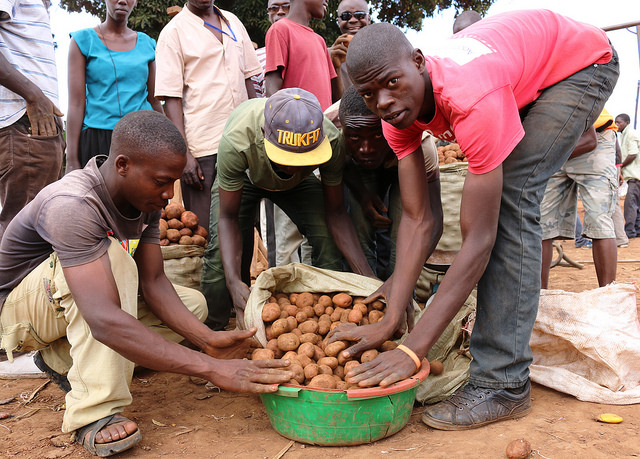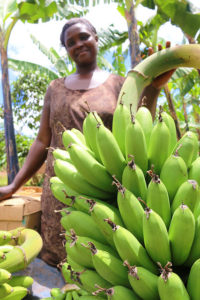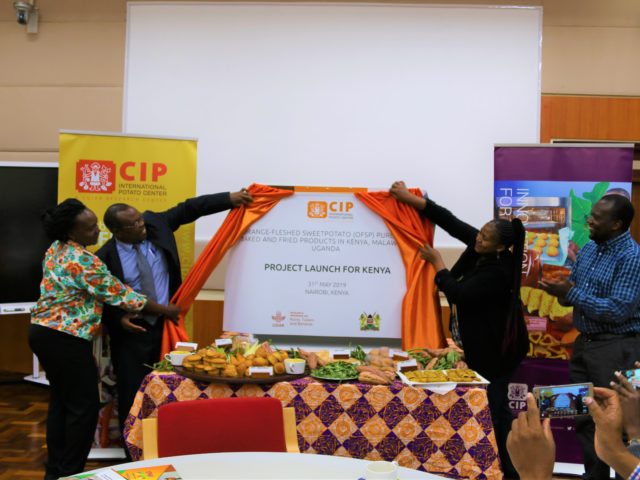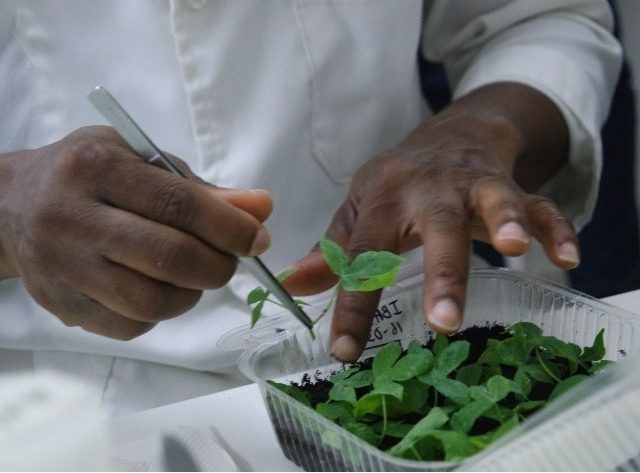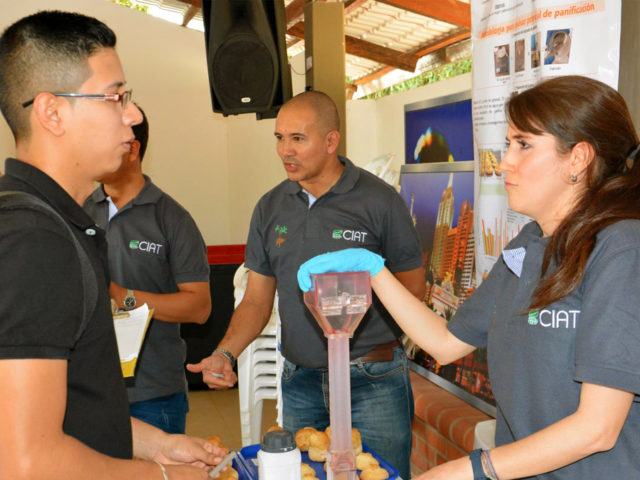In Uganda, gender roles in production, processing and marketing of root, tuber and banana crops are complex. Key decisions on production and marketing are often made by men, although women majorly provide labor at crucial stages of production. In the example of potato production and marketing in eastern Uganda, though women are responsible for key production processes, men primarily control harvesting and marketing of the crop. Men also tend to dominate wholesale trade while women are in charge of retailing.
As innovations, including in postharvest and marketing, become more available to farmers, men tend to take over responsibilities for roles that might have previously been largely the domain of women. Men are also likely to adopt new technologies faster than women, especially if they are capital intensive, and studies show that social norms in Uganda may also prevent women from taking up new technologies. For example, women may not have equitable access to training, inputs like land and farming equipment as well as capital which are critical to the adoption of new technologies. Additionally, women may not be empowered to make investment decisions at household level.
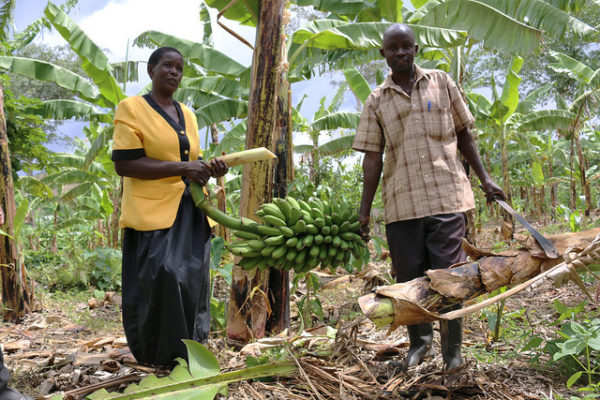
In Uganda, the key decisions on production and marketing of root, tuber and banana crops are usually made by men. Photo by S.Quinn/CIP
This implies that if gender issues are not taken into account, interventions aiming at value chain development may preclude women from taking full advantage of emerging market opportunities, or even affect them negatively. It is therefore necessary that gender empowerment is promoted in the effort to develop and strengthen root tuber and banana value chains.
The ‘Expanding utilization of roots, tubers and bananas and reducing their postharvest losses’ (RTB-ENDURE) project prioritizes gender mainstreaming so as to develop gender sensitive interventions. As such, a Gender Action Plan (GAP) was developed by the gender team to ensure that men and women benefit equitably from the project interventions. In execution of the GAP, two situational analyses of the potato and cooking banana value chains in Uganda were recently conducted.
Here we highlight key findings of these studies:
- RTB-ENDURE is testing and validating potato storage
technologies. Female farmers are more concerned than men about using poor quality seed which results in poor quality ware potatoes that are more difficult to store and market due to high perishability. Women are responsible for producing and storing seed within households, yet report they are rarely if ever targeted by training on good agronomic practices. Therefore, there is need to promote training of women in this area, as well as selecting them to host demonstration trials where applicable.
- Due to unequal power relationships within households, men often decide how much, where and whom to sell to, as well as how to use income from potato often without consulting women. Women also report that gender norms designated potato as a men’s crop, implying that women who try to sell potato on their own without their husbands are viewed with suspicion. In some cases, traders raise the price of seed potato and lower the price of ware potato if female farmers are the ones buying or selling, respectively. Women shared that this may deter them from benefiting from higher sales and income from stored potato.
- Both men and women report that limited access to financial services is a key hindrance to potato production. However, female farmers are particularly affected since poor access to credit is coupled with limited control over income from potato sales. Therefore, they find difficult to timely access inputs like fertilizers, pesticides, herbicides and farming tools leading to low yields and hıgh postharvest losses. Both men and women mentioned the need for training in savings and credit management as well as better linkages to Micro Finance Institutions and other credit providers.
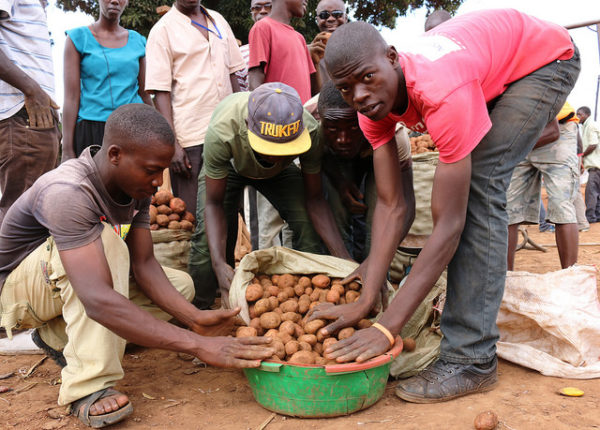
In Uganda potato is viewed as a men’s crop. Women who sell potato on their own without their husbands are often viewed with suspicion. Photo by S.Quinn/CIP
- Female traders incur higher postharvest losses since improved storage facilities are not available and, moreover, they are often forced to procure lower quality potato due to capital constraints. This implies that they have a very narrow marketing window before their potato spoil, and thus highly welcome the effort for improving the postharvest management. However, the nature of their trade (retail) and low representation in management positions may prevent them to fully benefit.
- Female farmers face major challenges in accessing production equipment and hired labor, particularly in peak production seasons. They also decry exclusion from planning and budgeting for proceeds from banana sales as a major problem since men exclude them from marketing. Suggested solutions include access to financing mechanisms to procure quality equipment and agro-inputs as well as sensitization of couples on joint visioning and planning for the family.
- Male farmers mentioned that brokers obstruct direct interaction between producers and traders or final buyers. As a result, farmers are forced to trade at local level. Furthermore, they face seasonal price fluctuations and at times they completely fail to sell their produce. Suggested solutions included linkage to reliable traders/markets, strengthened dialogue with the final buyers, formation of marketing groups and linking such groups to buyers who purchase by weight.
- The perennial nature of the crop makes loan providers averse to providing credit, and delays in approval of loans prevent farmers from procuring required inputs on time. The proposed strategies include linkages to credit providers who are willing to design agricultural friendly loan packages, including women friendly loan products.
- Female traders face constraints related to mobility. Banana trade requires inspection of banana gardens and selection of marketable bunches. These activities are challenging for women who mostly depend on men for this. Negotiating with final buyers in major cities requires transportation that is often out of reach for women.
Because women accept these gender inequalities as the way things have always been, the solutions they suggested focused mostly on addressing their practical gender needs – such as better knowledge of potato seed storage to reduce problems they may encounter with their husbands in case the stored seed does not sprout well.
However, the gender strategies proposed for both crops seek to address both practical gender needs and strategic gender interests. For example, it is also clear that women are underrepresented in the management of potato associations but simply electing women into leadership positions that do not involve strategic decision making may not be effective. Women need to be able to meet their strategic gender interests and this may require training on management and negotiation skills.
These reports, besides guiding the implementation of RTB-ENDURE to ensure that the proposed innovations benefit both men and women, also contain important lessons for researchers and policy makers working in the postharvest domain in Uganda and other sub Saharan African countries.
RTB-ENDURE is a three-year initiative (2014-2016) implemented by the CGIAR Research Program on Roots, Tubers and Bananas that is funded by the European Union with technical support from IFAD.
